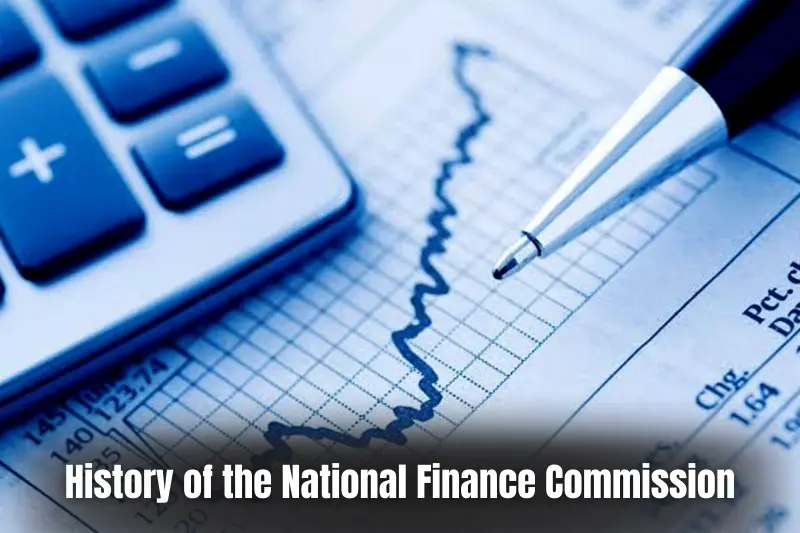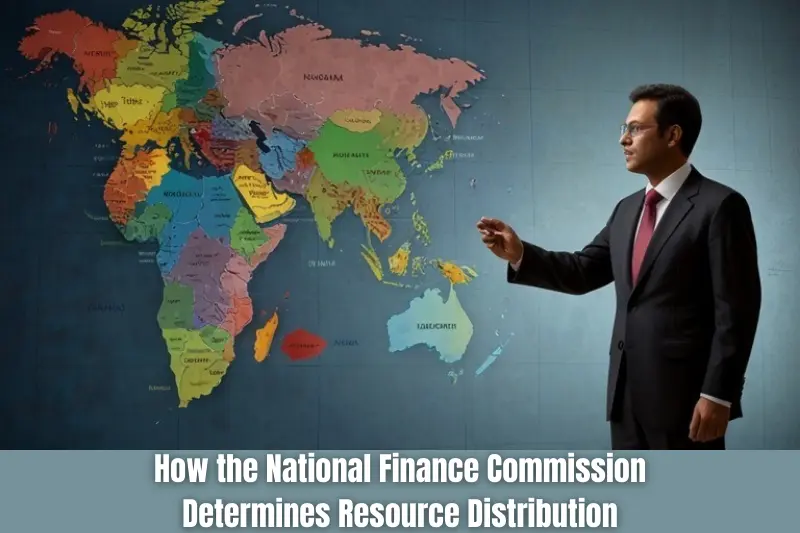The National Finance Commission (NFC) plays a crucial role in ensuring fair financial distribution across a country. It is a government body that works to allocate resources between the federal and provincial governments. The goal of the National Finance Commission is to create a system where every region gets its fair share of financial resources to support growth and development.
By managing the distribution of funds, the NFC helps balance the economic needs of different regions, ensuring that no area is left behind. In this article, we will explore the key functions, history, and challenges faced by the National Finance Commission, and how it influences the financial landscape of a country.
History of the National Finance Commission
The National Finance Commission was established to ensure a fair distribution of financial resources between the federal and provincial governments. Over the years, it has evolved to meet the changing financial needs of the country.

Establishment of the National Finance Commission
- The NFC was set up to create a transparent and fair method of resource allocation.
- It aimed to reduce economic disparities between regions.
- The first NFC was formed in 1951 in Pakistan, marking the beginning of a more organized system for financial distribution.
Key Milestones in its Evolution
- First NFC Award (1951): The first major financial agreement that outlined the share of resources for provinces.
- NFC Reforms (1974): A revision of resource allocation formulas to ensure more equal distribution.
- NFC Award 2009: A historic milestone where provinces were granted a larger share of the national revenue, further promoting regional development.
- Ongoing Reforms: The NFC continues to evolve, adapting to new challenges and ensuring financial justice across all regions.
You may also like it:
Personal Finance Guide: Tips for Financial Success
Smart Home Trends: Top Innovations for 2025
Easy Budgeting Tips: Manage Your Money Smartly
Objectives of the National Finance Commission
The National Finance Commission (NFC) has clear objectives to ensure that financial resources are distributed fairly and equitably across all regions of the country. Its role is to create a system where every province receives its fair share, promoting balanced growth and reducing disparities.
Ensuring Financial Fairness
- The NFC works to ensure that all regions receive resources based on their needs and contributions.
- It aims to reduce financial inequalities between federal and provincial governments.
- The commission sets a fair formula for resource allocation, making the process more transparent.
Promoting Balanced Economic Growth
- By ensuring a fair distribution of funds, NFC helps underdeveloped regions catch up with wealthier ones.
- It supports the development of infrastructure and social services in poorer provinces.
- NFC ensures that the federal and provincial governments work together to grow the entire nation.
Addressing Regional Disparities
- NFC strives to address the financial gap between rich and poor provinces.
- It considers factors like population size and economic performance to ensure fairness.
- The commission’s goal is to balance out the distribution of resources, making sure no region is left behind.
Fostering Cooperation Between Provinces and Federal Government
- NFC creates a platform for the federal and provincial governments to collaborate on financial matters.
- It ensures that both levels of government have a clear understanding of their financial responsibilities.
- By promoting cooperation, NFC helps to maintain peace and stability in financial matters.
Role and Functions of the National Finance Commission
The National Finance Commission (NFC) plays a vital role in managing the distribution of financial resources between the federal and provincial governments. Its functions ensure that resources are allocated in a way that promotes fairness, development, and financial stability across the country.
Managing Federal Resources
- The NFC determines how the national revenue is divided between the federal government and provinces.
- It ensures that both levels of government have enough resources to carry out their responsibilities.
- The commission reviews and updates resource-sharing formulas to reflect current economic conditions.
Allocating Resources to Provinces
- The NFC ensures that each province gets a fair share of the national revenue based on factors like population and financial needs.
- It aims to correct regional imbalances by providing more support to underdeveloped areas.
- The allocation is designed to help provinces fund public services, infrastructure, and development projects.
Influencing Provincial and Federal Finances
- The NFC has a direct impact on provincial budgets by determining the amount of funds they receive from the federal government.
- It helps the federal government ensure financial stability by managing how resources are distributed and spent.
- The commission’s decisions affect how provinces can manage their own finances and plan for future growth.
Promoting Economic Stability and Growth
- By ensuring an equitable resource distribution, the NFC promotes overall national economic growth.
- Its role in financial management helps avoid conflicts between federal and provincial governments over resources.
- The NFC helps maintain financial stability, which is essential for long-term development and growth across regions.
Role and Functions of the National Finance Commission
The National Finance Commission (NFC) plays a central role in managing and distributing financial resources between the federal and provincial governments. It ensures that resources are fairly allocated, fostering balanced development across the country.
Responsibilities of the NFC in Managing Federal Resources
- The NFC decides how much of the national revenue will be shared with provinces.
- It ensures that the federal government has enough funds to run national programs.
- The commission sets a formula for distributing taxes and revenues among federal and provincial governments.
- It reviews and updates the resource-sharing agreement regularly to address economic changes.
Impact on Provincial Finances
- The NFC directly influences how much money each province gets from the federal budget.
- It helps underdeveloped regions by allocating more resources to them, reducing regional inequalities.
- Provinces depend on NFC’s decisions to fund essential services like healthcare, education, and infrastructure.
- The NFC’s decisions impact provincial economic plans and development projects.
Impact on Federal Finances
- The NFC ensures that the federal government has a fair share of resources to manage national priorities.
- By balancing resource distribution, it helps the federal government maintain financial stability.
- The federal government uses NFC recommendations to plan national budgets and long-term financial strategies.
- The NFC’s role ensures that the federal government’s spending aligns with its constitutional duties and national priorities.
Structure of the National Finance Commission
The National Finance Commission (NFC) is made up of key representatives from both the federal and provincial governments. Its structure ensures that decisions are made collaboratively, considering the needs and interests of all regions.
Key Members Involved
- The NFC is typically headed by the Finance Minister of the federal government.
- Each province sends its own finance minister or designated representative to participate.
- Additional experts may be appointed to provide technical advice and support in decision-making.
- The Chairperson of the NFC is responsible for leading discussions and guiding the decision-making process.
Decision-Making Process
- Consensus-building is central to NFC decisions, where all members must agree on key issues before moving forward.
- The NFC uses data-driven analysis to assess financial needs and resources for both the federal and provincial governments.
- Decisions are made based on financial need, population size, and economic performance of provinces.
- Each province has a voice in the decision-making process to ensure fair representation of all regions.
Process of Consultation
- The NFC holds regular meetings to discuss financial issues, share information, and propose solutions.
- Consultations are carried out between the federal and provincial governments to gather opinions and discuss concerns.
- Provinces present their financial requirements and development goals during these consultations.
- The final decisions are made after thorough discussions, ensuring that each region’s needs are carefully considered.
How the National Finance Commission Determines Resource Distribution
The National Finance Commission (NFC) uses a specific formula to determine how national revenue is distributed between the federal and provincial governments. This ensures that each province gets its fair share based on its needs and resources.

The Formula Used for Resource Allocation
- The NFC uses a revenue-sharing formula based on factors like population size, financial need, and revenue generation.
- The formula is reviewed and updated regularly to reflect economic changes and regional disparities.
- The formula is designed to ensure that both the federal and provincial governments receive an appropriate share of the national revenue.
- It focuses on fairness, ensuring that provinces with fewer resources or higher needs get more support.
Factors Influencing the Distribution
- Population Size: Provinces with a larger population typically receive a higher share to cater to their greater public service needs.
- Revenue Generation: Provinces that generate more revenue through taxes or natural resources may get a smaller share, as they are seen as self-sufficient.
- Economic Need: Provinces with lower income levels or economic challenges often receive more support to help boost development.
- Fiscal Effort: The level of financial effort made by provinces to collect taxes and manage their resources can influence their share.
Other Considerations
- Geographical and Social Disparities: The NFC may also consider regional imbalances, such as underdeveloped areas that need more financial aid for growth.
- Natural Resources: Provinces rich in natural resources may receive special allocations to support sustainable development.
- Historical and Political Factors: Past financial agreements and political compromises may also play a role in determining allocations.
Key Reforms and Recommendations by the National Finance Commission
The National Finance Commission (NFC) has played a crucial role in initiating reforms to improve the financial system of the country. These reforms focus on ensuring fairness, supporting regional development, and strengthening the overall economy.
Notable Reforms Initiated by the NFC
- Increased Provincial Share (2009 NFC Award): The NFC recommended a significant increase in the share of provinces from 47.5% to 57.5% of the national revenue.
- Resource Allocation Based on Needs: The NFC emphasized distributing funds based not only on population but also on each province’s financial needs and development challenges.
- Revenue Generation Initiatives: Reforms encouraged provinces to improve their own revenue generation capacity, enabling them to become more self-sufficient.
- Special Allocations for Underdeveloped Regions: NFC recommended additional resources for poorer provinces to reduce the gap in development.
Impact on Local Economies
- Improved Regional Development: By allocating more funds to underdeveloped areas, the NFC has helped boost infrastructure, education, and healthcare services in poorer provinces.
- Poverty Reduction: The redistribution of funds has led to better poverty alleviation efforts, particularly in regions that had historically been left behind.
- Enhanced Local Governance: Provinces have more financial control, allowing them to make decisions that suit their unique economic and social needs.
Impact on the National Economy
- Balanced Economic Growth: The NFC’s reforms have promoted more balanced economic growth across the country, reducing regional inequalities.
- Stronger Federal-Provincial Relations: By ensuring fair resource distribution, the NFC has strengthened cooperation between federal and provincial governments.
- Increased National Productivity: With more funding directed toward regional development, the national economy has benefited from improved infrastructure, human capital, and overall productivity.
Challenges Faced by the National Finance Commission
The National Finance Commission (NFC), despite its important role, faces several challenges in ensuring a fair and effective distribution of financial resources. These challenges include disagreements between provincial and federal governments, as well as financial and political constraints.
Disagreements Between Provinces and Federal Government
- Conflicting Interests: Provinces often have different priorities, which may lead to disagreements on the allocation of resources.
- Unequal Development Needs: Some provinces feel they should receive a larger share of resources due to their higher needs or lower levels of development.
- Disputes Over Formula Adjustments: Every time the formula for resource distribution is reviewed, provinces and the federal government may have different views on what is fair.
- Political Pressure: Provinces sometimes use political influence to push for a larger share, creating tension and slowing down decision-making.
Financial Constraints
- Limited National Revenue: The federal government often faces challenges in generating enough revenue to meet the financial needs of both federal and provincial governments.
- Debt and Budget Deficits: High national debt and budget deficits can limit the ability of the federal government to allocate sufficient resources to provinces.
- Economic Downturns: In times of economic slowdowns, the available resources for distribution may shrink, leading to difficult decisions and further disagreements.
Political Challenges
- Election-Year Tensions: During election years, political factors often influence NFC decisions, leading to short-term compromises instead of long-term solutions.
- Inconsistent Policies: Changes in government can lead to shifts in policy priorities, which can affect how resources are distributed and managed.
- Lack of Consensus on Key Reforms: Political differences between the federal and provincial governments can delay or block necessary reforms to the NFC structure.
Impact of the National Finance Commission on Development
The National Finance Commission (NFC) has played a vital role in promoting development across all regions of the country. By ensuring fair resource distribution, the NFC contributes to reducing regional disparities and supporting economic growth in underdeveloped areas.
How NFC Has Contributed to Regional Development
- Improved Infrastructure: Increased financial allocations to provinces have helped fund essential infrastructure projects like roads, schools, and hospitals.
- Support for Social Services: The NFC’s decisions ensure that provinces have the necessary resources to improve healthcare, education, and welfare services.
- Boost to Local Economies: Provinces, especially those that are economically weaker, have been able to invest in local industries and create job opportunities.
- Reduction in Regional Inequality: By directing more funds to poorer provinces, the NFC has helped reduce the gap in development between richer and poorer regions.
Case Studies or Examples
- Punjab’s Development in Education: Increased financial allocations from the NFC have allowed Punjab to enhance its education system, building more schools and providing better teacher training.
- Balochistan’s Infrastructure Growth: Balochistan, one of the least developed provinces, has benefited from higher NFC resources, leading to improved road networks and increased access to healthcare.
- Khyber Pakhtunkhwa’s Health Sector Improvement: NFC funds have enabled Khyber Pakhtunkhwa to improve healthcare facilities, especially in remote areas, ensuring better medical services for locals.
- Sindh’s Poverty Alleviation Programs: Sindh has used NFC funds to launch various poverty reduction programs, focusing on rural areas with high levels of unemployment and poverty.
Conclusion
The National Finance Commission (NFC) plays a crucial role in ensuring that financial resources are fairly distributed across the country. By allocating funds based on the needs and economic conditions of each province, NFC helps promote balanced development, reduce regional inequalities, and improve local economies.
Its decisions have led to better infrastructure, social services, and overall growth in underdeveloped areas, making it a key driver of national progress.
Common FAQs on the National Finance Commission (NFC)
What is the National Finance Commission (NFC)?
The NFC is a government body that decides how financial resources are distributed between the federal and provincial governments to ensure fairness and balanced development.
When was the NFC established?
The NFC was established in 1951 to help create a fair system for resource allocation in the country.
How does the NFC decide how much money each province gets?
The NFC uses a formula based on factors like population size, financial needs, and revenue generation to allocate resources between the federal and provincial governments.
Why is the NFC important?
The NFC ensures that all provinces receive their fair share of national revenue, helping to reduce regional inequality and support development in less developed areas.
How often does the NFC review the allocation formula?
The NFC reviews and updates the resource allocation formula regularly to keep up with changes in the economy and population.
Does the NFC only work with financial resources?
While it focuses mainly on financial distribution, the NFC’s decisions can also influence key sectors like education, healthcare, and infrastructure, helping to promote balanced growth.
Who makes decisions in the NFC?
The NFC consists of representatives from both the federal and provincial governments, including finance ministers and experts who collaborate to make decisions.
Bonus Points
- The NFC helps foster unity by ensuring that provinces have a say in financial decisions.
- It supports fair financial sharing, reducing the chance of conflicts between the federal and provincial governments.
- Transparency in resource allocation ensures that no region is unfairly left behind.
- The NFC encourages accountability, pushing provinces to use allocated resources efficiently.
- It has helped improve public services like healthcare, education, and sanitation in less developed regions.
- The NFC’s reforms have improved poverty alleviation efforts, especially in economically backward provinces.
- It has strengthened the federal-provincial relationship, making it easier to collaborate on national projects.
- The NFC system has been instrumental in promoting regional economic independence, allowing provinces to manage their finances.
- Regular updates to the allocation formula ensure that the distribution remains relevant to current economic conditions.
- By promoting equitable growth, NFC has paved the way for sustainable national development.
You may also like it:
Saving Money Tips for Students: Master Your Finances Now!
Startup Marketing Strategies: Boost Your Business Fast
Startup Funding Sources: Top Options for Your Business
Aajkitajikhabar.com Business: Insights and Growth | TeckJB com







